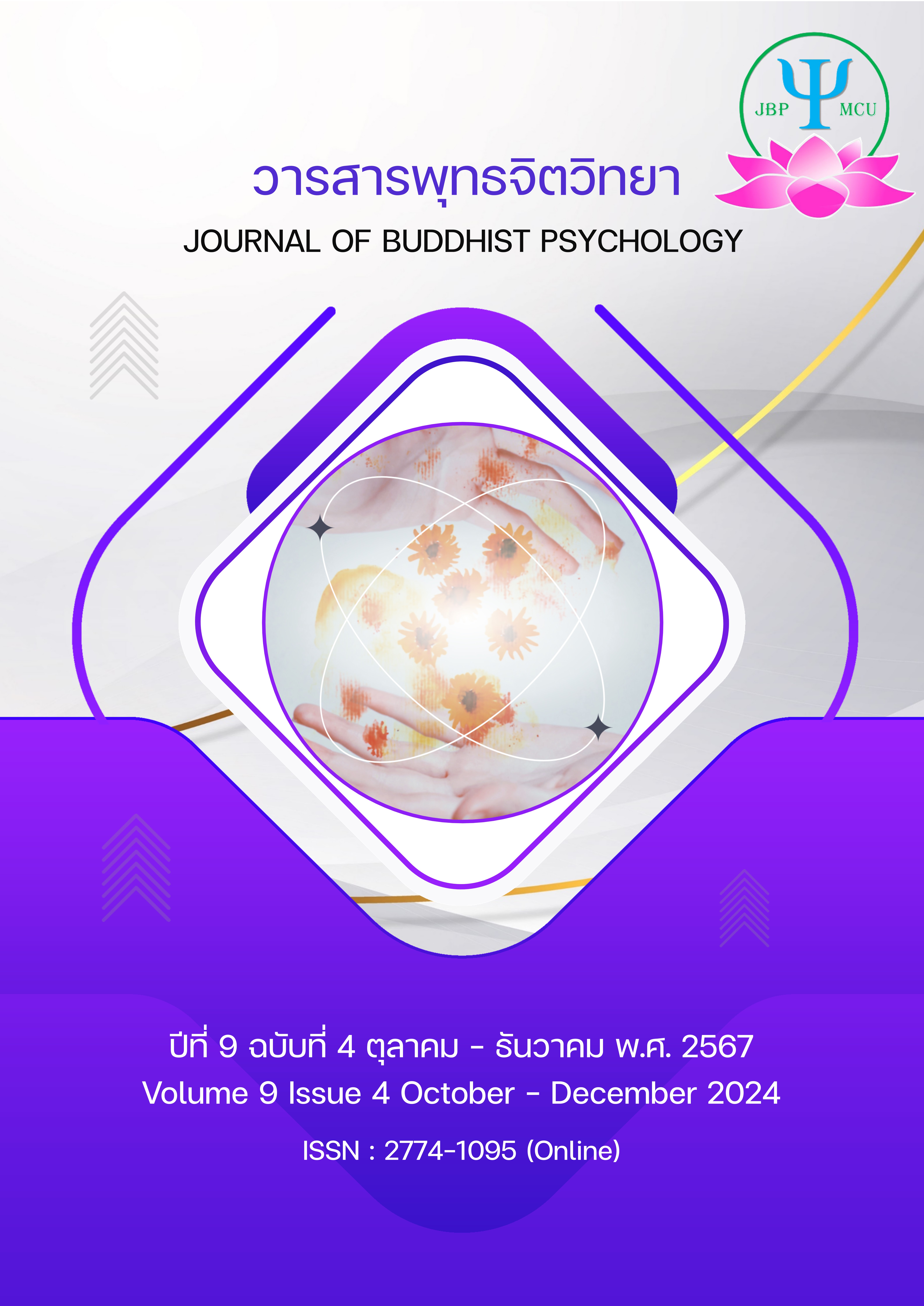พระพุทธศาสนากับการดำเนินชีวิตในยุคดิจิทัล: การปรับตัวและความท้าทาย
Main Article Content
บทคัดย่อ
บทความนี้มุ่งศึกษารูปแบบการเข้าถึง การสื่อสารแนวทางใหม่ๆ การปรับเปลี่ยนของพุทธศาสนาในยุคดิจิทัลที่เหมาะสมสอดคล้องกับสภาพแวดล้อมและเทคโนโลยีที่กําลังเปลี่ยนแปลงอย่างรวดเร็ว 2.ประเด็นปัญหาที่ส่งผลกระทบต่อการเข้าถึงพุทธศาสนาที่เกิดขึ้นในปัจจุบันและอาจเกิดในอนาคต 3. นำเสนอวิธีการปรับตัว และการพัฒนาปรับเปลี่ยนรูปแบบการเข้าถึงการศึกษาเกี่ยวกับหลักธรรมคําสอนของพุทธศาสนาให้มีประสิทธิภาพ พบว่า ในยุคดิจิทัลที่เทคโนโลยีมีบทบาทสำคัญในชีวิตประจำวัน พระพุทธศาสนาต้องเผชิญกับความท้าทายในการรักษาบทบาทและคุณค่าในสังคมที่เปลี่ยนแปลงอย่างรวดเร็ว การปรับตัวของพระพุทธศาสนาในยุคนี้จึงเป็นสิ่งจำเป็น โดยเฉพาะในเรื่องการใช้เทคโนโลยีในการเผยแผ่คำสอน การสอนธรรมออนไลน์ และการใช้โซเชียลมีเดีย อย่างไรก็ตาม การปรับตัวดังกล่าวยังมีความท้าทายในเรื่องของการรักษาความบริสุทธิ์ของคำสอนและการดึงดูดความสนใจของผู้คน พระพุทธศาสนาจึงต้องพัฒนาวิธีการใหม่ ๆ ในการเผยแผ่คำสอนเพื่อให้ยังคงมีความสำคัญในชีวิตประจำวันของผู้คนในยุคดิจิทัลอย่างมีประสิทธิภาพ
Article Details

อนุญาตภายใต้เงื่อนไข Creative Commons Attribution-NonCommercial-NoDerivatives 4.0 International License.
เอกสารอ้างอิง
จิราภรณ์ ชื่นนิรันดร์. (2561). ผลของการปฏิบัติสมาธิต่อสุขภาพจิตในวัยรุ่น. วารสารวิจัยทางจิตวิทยาและพฤติกรรมศาสตร์, 7(2), 23-35.
พระพรหมคุณาภรณ์. (2562). ความพอเพียงกับความสุขตามหลักธรรมะ. วารสารพระพุทธศาสนาและปรัชญา, 3(1), 45-52.
พระธรรมปิฎก. (2559). ความสุขที่แท้จริงตามแนวทางพระพุทธศาสนา. วารสารสังคมศาสตร์และมนุษยศาสตร์, 5(1), 14-26.
สมจิตร สุวรรณสุจริต. (2563). การเจริญสติและสมาธิเพื่อความสมดุลในชีวิต. วารสารจิตวิทยา, 11(3), 101-110.
Chunsuvimol, A. (2022). The influence of Buddhism on Thai ethics and social structure. Journal of Southeast Asian Studies, 24(3), 45-67.
Campbell, H. A., & Tsuria, R. (2021). Religion, online practices, and digital media. London: Routledge.
Eysenbach, G. (2020). The impact of digital technologies on Buddhist practices. Journal of Religion and Technology, 15(3), 45-67.
Fox, J. (2020). Political Secularism, Religion, and the State: A Time Series Analysis of Worldwide Data. New York: Cambridge University Press.
Helland, C. (2007). Diaspora on the electronic frontier: Developing virtual connections with sacred homelands. Journal of Computer-Mediated Communication, 12(3), 956-976.
Campbell, H. A., & Tsuria, R. (2021). Religion, online practices and digital media. London: Routledge.
Gunaratana, B. H. (2011). Mindfulness in Plain English. Boston: Wisdom Publications.
Hunt, M. G., Marx, R., Lipson, C. & Young, J. (2018). No more FOMO: Limiting social media decreases loneliness and depression. Journal of Social and Clinical Psychology, 37(10), 751-768.
Kabat-Zinn, J. (2018). The Healing Power of Mindfulness: A New Way of Being. New York: Hachette Books.
Kuss, D. J., & Griffiths, M. D. (2017). Social networking sites and addiction: Ten lessons learned. International Journal of Environmental Research and Public Health, 14(3), 311-325.
Krämer, H. (2020). The spread of Buddhism and the role of digital media. California: University of California Press.
Livingstone, S. & Haddon, L. (2009). EU Kids Online: Final report. London: The London School of Economics and Political Science.
McMahan, D. L. (2012). The making of Buddhist modernism. New York: Oxford University Press.
Pew Research Center. (2020). How the pandemic has affected worship attendance and the sharing of faith. Retrieved May 13, 2024, from https://www.pewresearch.org/religion/2020/08/07/ how-the-pandemic-has-affected-worship-attendance-and-the-sharing-of-faith/
Pongsak, W. (2023). The challenges of Buddhism in modern Thai society. Asian Religious Studies, 8(2), 12-29.
Rosen, L. D., et al. (2016). Is Facebook creating “iDisorders”? The link between clinical symptoms of psychiatric disorders and technology use, attitudes and anxiety. Computers in Human Behavior, 29(3), 1243-1254.
Smith, J. (2019). Digital Dharma: The evolution of Buddhist teachings in the digital age. New York: Oxford University Press.
Supatanong, K. (2024). Adapting Buddhism in the digital age: Opportunities and threats. Buddhist Studies Today, 10(4), 89-104.
Tantipong, R. (2024). Maintaining the integrity of Buddhist teachings in a changing world. Journal of Buddhist Ethics, 18(1), 101-117.
Thich Nhat Hanh. (2015). The miracle of mindfulness: An introduction to the practice of meditation. Boston: Beacon Press.
Twenge, J. M. (2019). The sad state of happiness in the United States and the role of digital media. World Happiness Report, 2019, 68-87.
Van Gordon, W., Shonin, E., & Griffiths, M. D. (2017). The psychological benefits of mindfulness practices in digital environments. Mindfulness, 8(2), 345-354.


